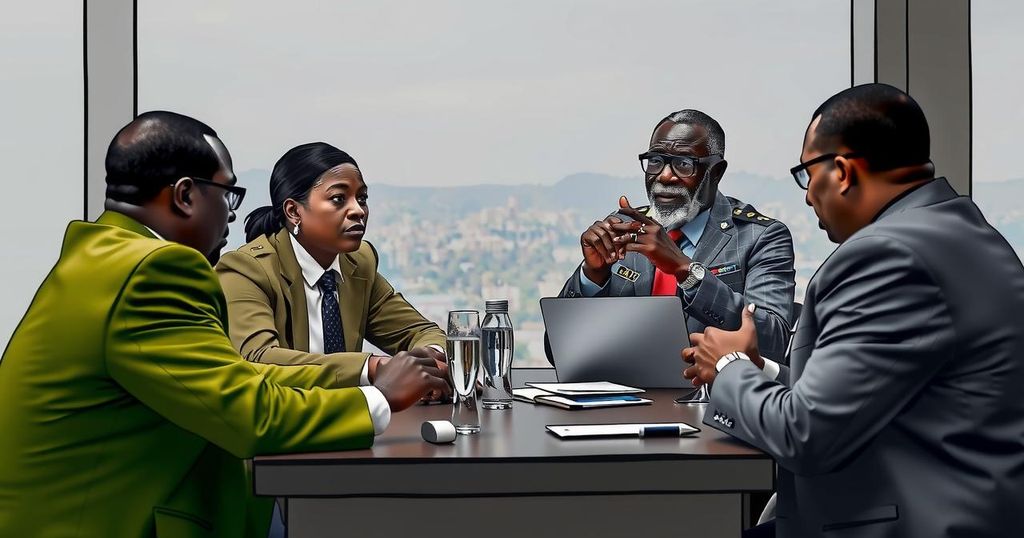Politics
AFRICA, AM, ANGOLA, CONFLICT RESOLUTION, COOPERATION, CORRUPTION, DEMOCRACY, DEMOCRATIC REPUBLIC OF CONGO, FDLR, GREAT LAKES REGION, KT, KT PRESS, M25, NDUHUNGIREHE, NORTH AMERICA, OLIVIER NDUHUNGIREHE, REGIONAL COOPERATION, RWANDA, TE, TÉTE ANTÓNIO, THÉRÈSE KAYIKWAMBA WAGNER, THERESE KAYIKWAMBA WAGNER, UNITED STATES
Fatima Khan
0 Comments
DRC’s Political Commitment Essential for Success of Peace Process in Eastern DRC
Rwanda’s Minister of Foreign Affairs warned that the DRC’s lack of political will could jeopardize the peace process established through the Luanda Agreement. The DRC’s military actions and inflammatory remarks from its leadership raise serious concerns about adherence to the peace accord. Despite ongoing discussions, Rwanda remains wary of the DRC’s sincerity in the negotiations, citing hostility and hate speech as factors undermining stability in the region.
The Democratic Republic of Congo’s (DRC) lack of political commitment and sincerity could undermine the recent strides made in the Luanda Process aimed at restoring peace in Eastern DRC and the Great Lakes Region. This warning was articulated by Rwanda’s Minister of Foreign Affairs, Amb. Olivier Nduhungirehe, following a virtual meeting held to discuss the draft peace agreement. Despite an agreement signed between Rwanda and the DRC in Luanda, concerns arose regarding the DRC’s military actions and inflammatory statements from its officials, which contradict the essence of the peace process.
Amb. Nduhungirehe expressed dismay over the DRC’s actions, including its militarization efforts and specific attacks against M23 positions, citing a lack of political will to adhere to the signed agreements. The Minister pointed out that the DRC Army continued hostile operations and rhetoric that incited violence against individuals associated with Rwanda. Furthermore, statements made by President Tshisekedi and Justice Minister Constant Mutamba reflected a troubling disregard for the agreed-upon commitments between the two nations.
Given the DRC’s perceived unwillingness to cooperate, Rwanda maintains that it will not reduce its defensive measures, as ongoing hate speech and violence pose significant security concerns. Despite these challenges, discussions continue under the facilitation of Angola, with hopes of addressing underlying issues and ultimately achieving a sustainable resolution to the conflicts affecting the region.
The ongoing conflict in Eastern DRC has long been a source of tension in the Great Lakes Region. In 2023, a groundbreaking agreement was achieved in Luanda, Angola, aimed at fostering dialogue and cooperation between Rwanda and the DRC, both of which have been entangled in a complex web of military and political disputes. However, skepticism about the DRC’s commitment to peace has remained a critical concern, particularly following conflicting military actions and inflammatory rhetoric from DRC officials. The context of these events is rooted in historical grievances that have fueled hostilities between the neighboring countries, necessitating genuine collaboration to address and resolve underlying issues systematically. Amb. Nduhungirehe’s focus on the importance of good faith reflects a broader apprehension regarding the DRC’s approach to peace negotiations and its implications for regional stability. The expectation for both nations to engage in a constructive dialogue has never been more pertinent, given the persistent cycle of violence and unrest in the area.
In conclusion, the viability of peace in Eastern DRC hinges significantly on the political will and sincerity of both the DRC and Rwanda. As highlighted by Minister Nduhungirehe, the divergence between promises made and actions taken by the DRC raises serious concerns about the future of the Luanda Process. Continued inflammatory rhetoric and military hostilities threaten not only the peace efforts but also the broader stability of the Great Lakes Region, underscoring the urgent need for a collective commitment to dialogue and resolution of the ongoing conflict.
Original Source: www.ktpress.rw




Post Comment